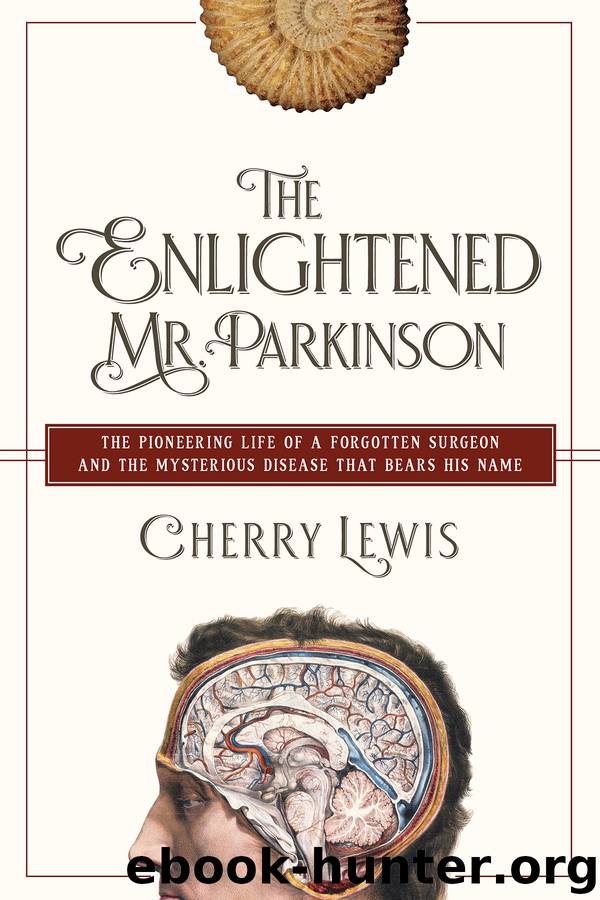The Enlightened Mr. Parkinson by Cherry Lewis

Author:Cherry Lewis
Language: eng
Format: epub
Publisher: Pegasus Books
The fossil tubipore in limestone from Derbyshire (centre) on which Parkinson performed his experiment. Top left, a cross-section of the coral and, top right, the ‘animal membrane’ which remained after he had dissolved away the ‘marble’ in which it was embedded.
Another discovery Parkinson reported in this volume regarded crinoids, marine organisms that even today are the least understood of living echinoderms (starfish, sea urchins, sea cucumbers, etc.), although their skeletal remains are among the most abundant fossils to be found. With a long stalk and cuplike body bearing five, usually branched and commonly featherlike, fronds, at the time it was not clear if they were animals or plants, or even which way up they had lived. It was Parkinson who realised that the fronds were tentacles and not roots, as had previously been supposed. A fellow fossilist enthused about this revelation:
It is this ingenious discovery and exposure of an error of former writers on these animals, which has greatly contributed to the better understanding of their economy and anatomical details. Mr. PARKINSON’s able work on the Organic Remains of a Former World must indeed be considered as the publication of the greatest importance in the study of these remains, and in particular as having given a great impulse in England to their investigation.37
Parkinson studied his fossils with a hand lens, in cut and polished sections, and even by shining light through thin slices of them under a microscope, much as we might do today.38 He also applied his knowledge of chemistry in an attempt to understand how they had formed, but, as we have seen, his demanding practice mostly kept him tied to London, and he had little time to go out into the field to look for specimens himself. In the autumn of 1807 he did visit his geologist friend Joseph Townsend in Bath, and in the summer of 1812 he travelled via Salisbury to Lyme Regis, looking at the geology en route. Undoubtedly he spent time exploring Lyme’s famous fossil beach, but whether the tour embarked upon by the protagonist of Organic Remains volume one to ‘visit the most interesting parts of this island’ actually occurred in real life is unknown. A comment written in the margin of that volume by one of his early readers suggests not: ‘No one would think this writer had ever wandered further than ye sound of Bow Bells.’39 Clearly some of his contemporaries felt he lacked field experience.
Over the next three years Parkinson pressed on with his investigations and by 1811 he was ready to publish his third volume. But then, very unexpectedly, a most unpleasant incident occurred that was to seriously threaten his peace of mind and his by then quite considerable reputation.
Download
This site does not store any files on its server. We only index and link to content provided by other sites. Please contact the content providers to delete copyright contents if any and email us, we'll remove relevant links or contents immediately.
| Administration & Medicine Economics | Allied Health Professions |
| Basic Sciences | Dentistry |
| History | Medical Informatics |
| Medicine | Nursing |
| Pharmacology | Psychology |
| Research | Veterinary Medicine |
The Immortal Life of Henrietta Lacks by Rebecca Skloot(4571)
An American Plague by Jim Murphy(3756)
The Emperor of All Maladies: A Biography of Cancer by Siddhartha Mukherjee(3138)
The Gene: An Intimate History by Siddhartha Mukherjee(3089)
The Fate of Rome: Climate, Disease, and the End of an Empire (The Princeton History of the Ancient World) by Kyle Harper(3055)
Rebecca Skloot by The Immortal Life of Henrietta Lacks(1996)
Stiff - The Curious Lives of Human Cadavers by Mary Roach(1845)
The Great Influenza by John M Barry(1777)
The Vaccine Race by Meredith Wadman(1648)
Hero by Michael Grant(1640)
Undue Risk by Moreno Jonathan D.;(1620)
Three Cups of Tea by Greg Mortenson(1606)
The Mystery of the Exploding Teeth by Thomas Morris(1565)
Quackery by Lydia Kang(1547)
Autism's False Prophets by Paul A. Offit(1534)
Extremes: Life, Death and the Limits of the Human Body by Fong Kevin(1516)
A Journal of the Plague Year (Oxford World's Classics) by Daniel Defoe(1509)
Steroids: History, Science, and Issues by Standora Joan E.; Bogomolnik Alex; Slugocki Malgorzata(1507)
The Vaccine Court by Rohde Wayne(1494)
